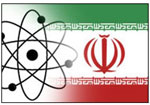 AFP: The UN nuclear agency expressed confidence Friday that it will clinch a deal with Iran next month under which Tehran will at last answer “credible” evidence of atomic weapons research, but analysts and diplomats were sceptical. By by Simon STURDEE
AFP: The UN nuclear agency expressed confidence Friday that it will clinch a deal with Iran next month under which Tehran will at last answer “credible” evidence of atomic weapons research, but analysts and diplomats were sceptical. By by Simon STURDEE
 VIENNA (AFP) — The UN nuclear agency expressed confidence Friday that it will clinch a deal with Iran next month under which Tehran will at last answer “credible” evidence of atomic weapons research, but analysts and diplomats were sceptical.
VIENNA (AFP) — The UN nuclear agency expressed confidence Friday that it will clinch a deal with Iran next month under which Tehran will at last answer “credible” evidence of atomic weapons research, but analysts and diplomats were sceptical.
Returning from “good meetings” in Tehran on Thursday, International Atomic Energy Agency chief inspector Herman Nackaerts said that although Iran did not grant access to a key military base as hoped, this was “part of” the mooted accord.
Such a breakthrough, if it really happens, could indicate that Iran, under massive sanctions pressure — augmented by fresh US restrictions announced Thursday — may give ground in parallel diplomatic efforts with six world powers stalled since June.
But that is a big “if”, experts say.
“We have agreed to meet again on 16 January next year, where we expect to finalise the structured approach and start implementing it then shortly after that,” Nackaerts told reporters at Vienna airport.
Iran said the meetings were “constructive, positive, and good progress has been made”.
The IAEA wants Iran to address substantively a mass of what the agency calls “overall, credible” evidence set out in a major 2011 report that Iran did weapons research up until 2003, and possibly since then.
Iran denies seeking or ever having sought nuclear weapons, and has rejected the alleged evidence outright in a string of previous fruitless meetings with the IAEA this year in Tehran and Vienna.
This is because the bulk is from foreign intelligence agencies, including from arch-foe Israel, the Middle East’s sole if undeclared nuclear-armed state which has threatened to bomb Iran — intelligence that Iran wants the IAEA to show it.
The IAEA has zeroed in on Parchin near Tehran because its information on activities there is “independent”, such as from commercially available satellite imagery or an unnamed “foreign expert”.
Parallel efforts by “P5+1” world powers are focused more on Iran’s current activities, rather than the past, in particular Tehran’s expanding ability to enrich uranium to fissile purities of 20 percent.
Iran says that this is for a research reactor in Tehran producing nuclear medicines, but when further purified to 90 percent, such material can be used in a nuclear bomb.
Multiple UN Security Council resolutions have called on Iran to suspend all enrichment because the IAEA, which closely monitors Iran’s nuclear sites, says it is “unable” to conclude that all activities are peaceful.
The six powers — Britain, China, France, Russia, the United States and Germany — are thought to be discussing possible changes to an offer rejected by Iran in their last round of talks in Moscow in June, with a new meeting expected soon.
Mark Fitzpatrick from the International Institute for Strategic Studies in London warned in reference to the IAEA talks however that “we have been down this road before”.
“Back in January, Iran similarly led the IAEA to expect that a deal was in sight, only to find hardliners in Tehran insisting on putting up roadblocks,” Fitzpatrick told AFP.
Nackaerts returned from Tehran in late January after “good” talks, only for a subsequent meeting in February to fail to produce a deal. IAEA chief Yukiya Amano’s hopes for an accord “soon” after his trip to Iran in May also came to nothing.
“The IAEA does think it has made progress, and Iran does too,” one Vienna diplomat said after being debriefed further on Friday by the IAEA on the trip.
“But we are still cautious and sceptical … Until we see an agreement, and more importantly see it implemented, we wouldn’t be keen to call it progress.”
Diplomats also said that Iran could be seeking to give the appearance of being conciliatory in order to sidestep US efforts to get the IAEA board to refer Iran to the UN Security Council if there is no progress by March.
“They want to avoid something happening at the board meeting in March, that’s for sure,” a second envoy said. A referral to the UN Security Council “would be an excuse to increase sanctions more”.


